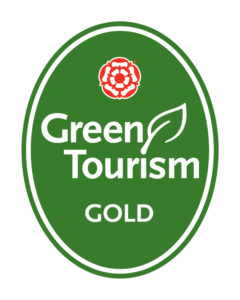Green tourism ‘silver status’ for all our venues
posted on Wednesday 8 January
NewsWe recognise our venues must do their bit to help the planet and are committed to reducing our environmental impact.
In 2017, OUEV signed up to the Green Tourism accreditation, a recognised certification programme which guides tourism and service venues through a rigorous criteria to achieve and build upon sustainability commitments. Since then, we have been working hard to provide a sustainable service to our customers, working closely with our partners and suppliers. Green Tourism has enabled us to celebrate what we have been doing well and helps us to keep improving.
Here are just some of the things we have been working on for our venues…
- Landfill policy – we have an absolute commitment to our zero to landfill policy. All waste is sent to anaerobic digestion which means it’s converted into electricity to power many local Oxfordshire homes.
- Localisation of our supplier base to minimise carbon footprint – all food on our menus comes from just three local Oxfordshire businesses – Roots, Aldens and Mayfield. The food is then prepared in our purpose-built kitchen in Oxford.
- Sourcing food in a responsible way – we only use MSC fish and Red Tractor meat.
- Vegetarian and vegan menus – our award-winning chefs have crafted delicious vegetarian and vegan menus with a variety of interesting and nutritious dishes.
- Planning food carefully to avoid unnecessary waste – where possible our knowledgeable team can advise you on your catering requirements to minimise food waste. Inevitably some waste does occur and when this happens we partner with OLIO, to minimise what we throw away by redistributing unwanted food to those in need in the local community and to minimise what we throw away.
- Reducing our energy consumption – we aim to build energy efficiency into our venues using automatic lights and energy saving light bulbs. We monitor our energy consumption and our electricity comes from renewable sources.
- Procuring Fairtrade – as a priority we want to widen the range of Fairtrade produce and products we supply on our menus. Current high volume items that are fair trade include tea, coffee, sugar sticks, chocolate bars and bananas. The University of Oxford is now a certified Fairtrade University, and we work closely with our caterers and the wider University to do our bit to contribute to the certification criteria.
- Reducing single-use plastic – we want to remove unnecessary single-use plastic and use biodegradable alternatives for coffee stirrers. Where possible we supply water in jugs, if that’s not to a client’s taste we offer fully recyclable bottles and as a last resort offer end-of-life recyclable plastic bottles.
- Introducing electric vehicles – our caterers use electric vans to transport all catering that cannot be made within the venue.
- Other Accreditations – as well as Green Tourism and Fairtrade, OUEV are proud members of Visit England and the Sustainable Restaurant Association. These accreditation’s have regular audits, which ensure we are meeting the high standards of sustainability that they expect from their members, and are continuously improving on our performance.
“St Luke’s Chapel has been beautifully restored with a combination of modern best practice and traditional conservation activities. The lighting is all LED and the toilets are water efficient. Outside the gardens are low maintenance with rainwater harvesting. The gardens are great for bees and pollinators and cycle hire facilities are close on hand. I am pleased to award Gold status for the Chapel” Green Tourism Assessor 2017.
“The Sheldonian Theatre has done well to gain a Silver award given that it is a historic building with some old features. The conservation work using traditional paints and restoration has been excellent. Also the onsite team is positive and focused and has found some eco options like detergents and fair trade refreshments. The building has some natural features which help maintain the temperature of the building without excessive air con.” Green Tourism Assessor 2017.
“Osler House achieves a Silver award thanks to a combination of some excellent activities and commitments by the University as a whole and some positive actions across the venue. The kitchens and dining areas are well maintained and the washrooms and toilets have some nice features from some dual flush toilets to efficient flow rates on taps. Healthy eating is promoted and the venue has condensing boilers and good overall controls.” Green Tourism Assessor 2017.
“The Examination Schools did very well to gain a strong Silver award at the first audit. The general estate and sustainability team is very strong and this helps all sites considerably but there are also local actions at the exam school which really add to a great score. The restoration of the main reception is excellent and there is a good programme to switch to LED lighting. Boilers are efficient and new fridges have the lowest impact gases (r600). Toilets are fairly efficient too with urinal flow sensors etc. Building conservation has restored an old sooty building to a high standard and the school should focus on the extra potential to gain a GOLD award next time. Green Impact display and signage is good also.
We have lots more plans for the next three years as the event and venues industry continue to innovate and strive towards sustainability. It is an exciting time!
And, here’s a list of a few of the things the wider University has been up to….
- Reducing our carbon emissions – despite the University’s estate growing by 33% over the past 10 years, we have reduced our carbon emissions from 133kg CO2 per metre squared to 95kg CO2 per metre squared, putting us near the top of many University league tables.
- Promoting sustainable travel – the Oxonbike pedal and electric bike scheme has seen pedal power cover a distance equivalent to travelling around the world, not just once but twice!
- Become England’s first swift city – we’ve partnered with Oxford City Council and the RSPB to stop the decline of the swift bird population. This project helps to maintain current swift nests across the city and will add a further 300 sites onto new and existing buildings.


